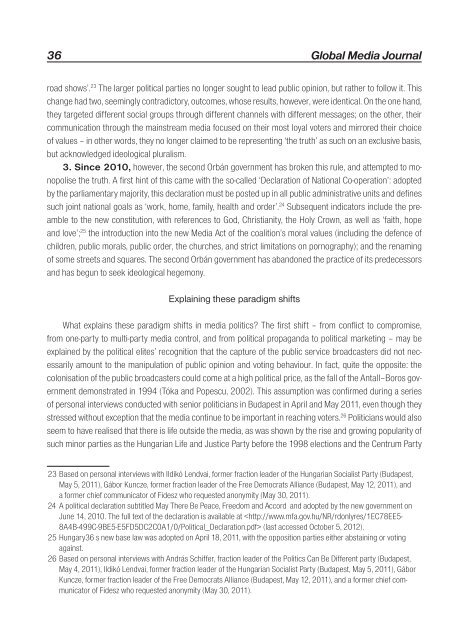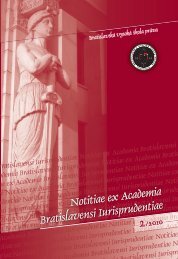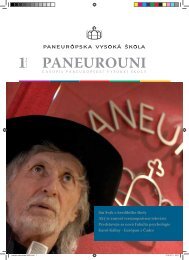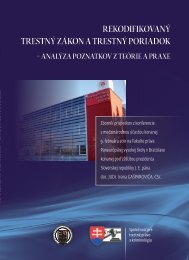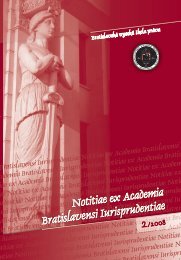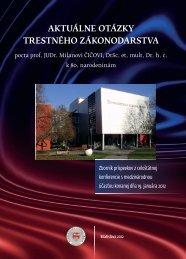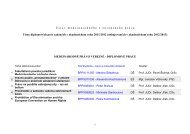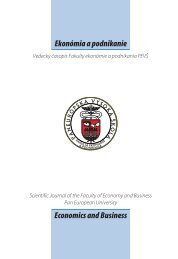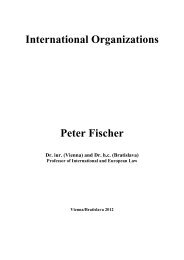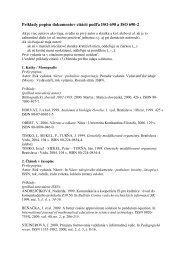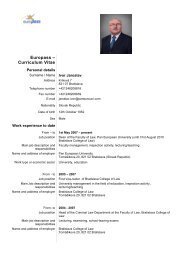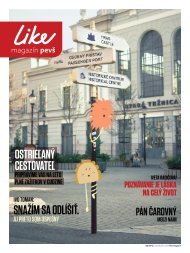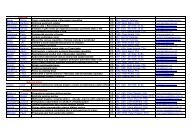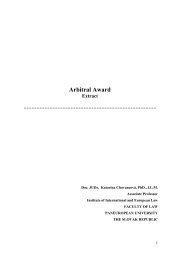ÄÃslo 1/2013 - Paneurópska vysoká Å¡kola
ÄÃslo 1/2013 - Paneurópska vysoká Å¡kola
ÄÃslo 1/2013 - Paneurópska vysoká Å¡kola
You also want an ePaper? Increase the reach of your titles
YUMPU automatically turns print PDFs into web optimized ePapers that Google loves.
36<br />
Global Media Journal<br />
road shows’. 23 The larger political parties no longer sought to lead public opinion, but rather to follow it. This<br />
change had two, seemingly contradictory, outcomes, whose results, however, were identical. On the one hand,<br />
they targeted different social groups through different channels with different messages; on the other, their<br />
communication through the mainstream media focused on their most loyal voters and mirrored their choice<br />
of values – in other words, they no longer claimed to be representing ‘the truth’ as such on an exclusive basis,<br />
but acknowledged ideological pluralism.<br />
3. Since 2010, however, the second Orbán government has broken this rule, and attempted to monopolise<br />
the truth. A first hint of this came with the so-called ‘Declaration of National Co-operation’: adopted<br />
by the parliamentary majority, this declaration must be posted up in all public administrative units and defines<br />
such joint national goals as ‘work, home, family, health and order’. 24 Subsequent indicators include the preamble<br />
to the new constitution, with references to God, Christianity, the Holy Crown, as well as ‘faith, hope<br />
and love’; 25 the introduction into the new Media Act of the coalition’s moral values (including the defence of<br />
children, public morals, public order, the churches, and strict limitations on pornography); and the renaming<br />
of some streets and squares. The second Orbán government has abandoned the practice of its predecessors<br />
and has begun to seek ideological hegemony.<br />
Explaining these paradigm shifts<br />
What explains these paradigm shifts in media politics The first shift – from conflict to compromise,<br />
from one-party to multi-party media control, and from political propaganda to political marketing – may be<br />
explained by the political elites’ recognition that the capture of the public service broadcasters did not necessarily<br />
amount to the manipulation of public opinion and voting behaviour. In fact, quite the opposite: the<br />
colonisation of the public broadcasters could come at a high political price, as the fall of the Antall–Boros government<br />
demonstrated in 1994 (Tóka and Popescu, 2002). This assumption was confirmed during a series<br />
of personal interviews conducted with senior politicians in Budapest in April and May 2011, even though they<br />
stressed without exception that the media continue to be important in reaching voters. 26 Politicians would also<br />
seem to have realised that there is life outside the media, as was shown by the rise and growing popularity of<br />
such minor parties as the Hungarian Life and Justice Party before the 1998 elections and the Centrum Party<br />
23 Based on personal interviews with Ildikó Lendvai, former fraction leader of the Hungarian Socialist Party (Budapest,<br />
May 5, 2011), Gábor Kuncze, former fraction leader of the Free Democrats Alliance (Budapest, May 12, 2011), and<br />
a former chief communicator of Fidesz who requested anonymity (May 30, 2011).<br />
24 A political declaration subtitled May There Be Peace, Freedom and Accord and adopted by the new government on<br />
June 14, 2010. The full text of the declaration is available at (last accessed October 5, 2012).<br />
25 Hungary36 s new base law was adopted on April 18, 2011, with the opposition parties either abstaining or voting<br />
against.<br />
26 Based on personal interviews with András Schiffer, fraction leader of the Politics Can Be Different party (Budapest,<br />
May 4, 2011), Ildikó Lendvai, former fraction leader of the Hungarian Socialist Party (Budapest, May 5, 2011), Gábor<br />
Kuncze, former fraction leader of the Free Democrats Alliance (Budapest, May 12, 2011), and a former chief communicator<br />
of Fidesz who requested anonymity (May 30, 2011).<br />
GMJ Book.indb 36 21.1.<strong>2013</strong> 9:44


